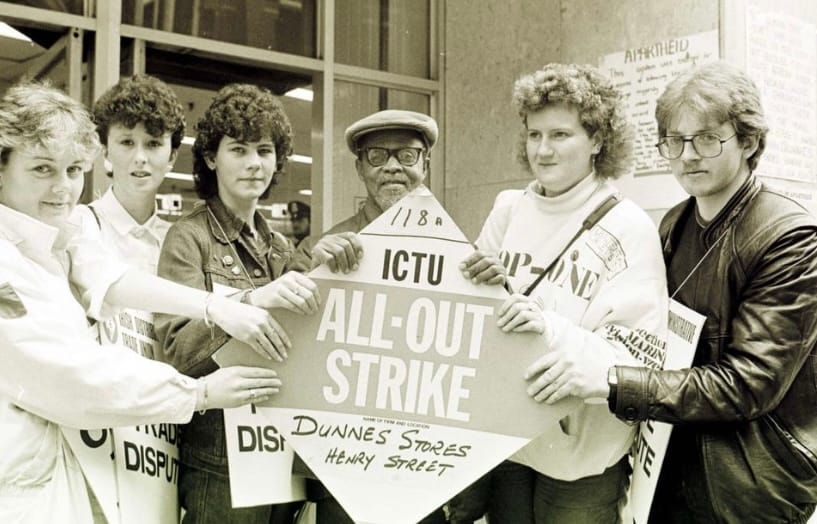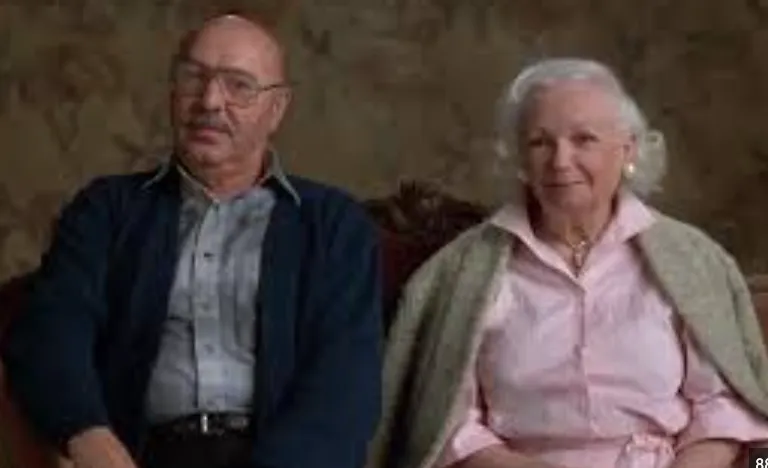The Grapefruit Ladies of Ireland
"Never, ever be afraid to make some noise and get in good trouble, necessary trouble." -- John Lewis

What a band of citrus sisters has to do with Kamala Harris; plus forcing parties, the next Edith Piaf, and doing your part for Banned Books Week.
This week I went with my friend Michelle to see Kamala Harris speak about her latest political memoir 107 Days. The talk was at 6:30 p.m. on a Wednesday, which meant Michelle and I started doing Atlanta traffic math about what time we should leave our respective houses to grab something to eat beforehand. I usually figure in things like the inevitable accident(s), or stalled vehicles, or that time that a fire collapsed a whole section of Interstate 85. Then it turns into "if the doors open at 5:30 p.m. and everyone is going to be searched, then maybe we need a reservation for 3:45 p.m. just in case." You add up these factors, and it's still a dice roll. Maybe you're early. Maybe you're on time. Maybe, like me this week, you're 15 minutes late and apologizing to death.
I'll admit I was originally pretty anxious about going to this event. I read the book a couple of weeks ago, and it honestly triggered me to relive those 107 days. I can only imagine what the former vice president felt as she wrote about it and the aftermath. I didn't think I could sit through the talk and remain mild-mannered, but I drank a beer and did my best. And my takeaway from Harris' talk is: this is not the time to bury your head and hope this all ends soon. Whether we realize it or not, each of us has the power in us to step up and make a difference.
While I was sitting in the audience, I thought about a wonderful story that a friend sent me recently. It's about some young Irish grocery workers in 1984 who refused to ring up South African grapefruit because their trade union told them to boycott goods from apartheid South Africa. The cashier who started this, Mary Manning, was suspended for her refusal to ring up two grapefruit. Nine other female workers walked out with her that day to form a picket line. Manning later wrote that she wasn't sure if she would have taken this stand if her employer had treated her and her colleagues better. At the time, she admitted she didn't even know how to spell apartheid, let alone define it. She just wanted to stick it to her boss.
Things evolved when she and the other strikers met a Black South African man named Nimrod Sejake, who claimed asylum in Ireland after being tried for treason with Nelson Mandela in 1962. Sejake joined the picket line and began sharing his real-life experiences. His family remained in South Africa, where he explained that things were like a pint of Guinness, with a thin layer of white sitting atop the black.
After hearing Sejake's stories, the women began to understand how bad apartheid was. Rather than just sticking it to their bosses, they decided they wouldn't go back to work until they no longer had to handle apartheid produce. Though other groups joined the fray, the media portrayed the normal young working class women who started it as evil political actors who should be grateful to have a job during a recession. This only gave their picketing more attention and support. Eventually Archbishop Desmond Tutu met with them, and invited them to South Africa so they could see apartheid for themselves. When the strikers were refused entry to the country, it sparked outrage. What could the government be hiding from these observers?
The Grapefruit Ladies of Ireland stood their ground for two years and nine months, barely subsisting on 21 pounds of strike pay a day to make a point that apartheid was bad. Their strike finally ended when the Irish state opted to ban all apartheid goods. In 1990, Nelson Mandela met with the Grapefruit Ladies, honoring their commitment. When he died, the ladies were invited to his funeral as Ireland's representatives. During their visit, they met the family of Nimrod Sejake, the exiled man who had inspired them to keep fighting.
When we fight the good fight, we are faced with choices, both big and small. Do we go along to get along? Do we cover our head and hope it goes away? Do we refuse to ring up two South African grapefruit on principle? Do we boycott a major retailer and cancel our subscriptions to major streaming services to make a big point? What will it take? How long will it take? How far are we willing to go? The person at the top is not the only person with the power to do things. We can too. And it's good to be reminded of that from time to time, as I was this week.
Consider this letter your reminder that you've got that power too.
Writing prompt: Write about a time when a little thing made a big difference. What was the little thing, and what sort of difference did it make?
Instead of drifting along like a leaf in the river, understand who you are and how you come across to people and what kind of impact you have on the people around you and the community around you and the world, so that when you go out, you can feel you've made a positive difference.
-- Jane Fonda
Endnotes
Is There Something You're Putting Off?
Sometimes we just don't want to tackle that one thing on our to-do list. Maybe it's an difficult email we need to send, or a household task we can't bear to face. Whatever it is, we promise to get to it later, but for some reason we just can't bring ourselves to do it. The Guardian ran a piece lately about a novel approach to getting things done. It's called a "forcing party" where you and a friend (or friends) get together for, say, an hour, so that you can nudge each other to do the things you don't want to do, before running off when it's over to do something you'd prefer to do. For more on this, click here to find out more about what it is, why it works, and whether you might get a good playlist out of it too.
The Second Coming of Edith Piaf

My first memory of hearing French songbird Edith Piaf sing was in French class. I was a teenager full of feelings, and so to hear this petite woman sing with such pain and passion really struck a chord with me. Interestingly enough, the song my French teacher played for us was not the ubiquitous "La Vie En Rose" but "Milord", which is a bit of a bop about a prostitute who longs for a refined gentleman. At first, our teacher didn't bother telling us about the song's subject matter. But when some of us started piecing together what seemed to be going on in the lyrics, we asked her, "hey, is this song what I think it's about?" And we were so persistent, we forced her to admit that yes, in fact, it was. As you might imagine, it took her a while to restore order to the classroom that day. Now, there is a next generation Edith who is creating a stir. She's 25-year-old Zaho de Sagazan, who, The New York Times writes, sings "breathlessly cool songs about not playing it cool". I've been listening to her music this week, and you can see why she has "become the shooting star of contemporary French pop music by reimagining an old-fashioned genre...for a younger, more dance-oriented audience." If you get a chance, Google her tunes and give them a listen. She's a whole mood.
What I hope you'll do this week
It's Banned Books Week, which means we should do whatever we can to celebrate and advocate for our right to read whatever we want, whenever we want. Here are some ways you can do that: stick a few banned books in a Little Free Library; call a school board member or city councilperson and ask them to support the right to read; go to the library and check out a banned book just to show that there are people out there who really want to read them; buy a couple of banned books from your local independent bookseller; and donate to organizations like the ACLU, American Library Association, and PEN America. Thank you!
Paige Bowers Newsletter
Join the newsletter to receive the latest updates in your inbox.




